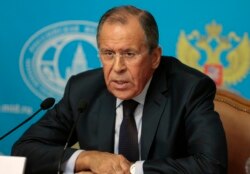VOA Persian’s Katherine Ahn contributed from Washington.
WASHINGTON - The remaining signatories to the 2015 international pact to restrain Iran's nuclear weapons development all voiced concern Tuesday that Tehran had exceeded the limit of how much low-enriched uranium it could stockpile.
Britain, France, Germany and the European Union said in a joint statement they had been "consistent and clear that our commitment to the nuclear deal depends on full compliance by Iran" and urged the Islamic Republic "to refrain from further measures that undermine" the accord.
The three countries and the EU said they "are urgently considering next steps" after Iran announced Monday that it had gone above the 300-kilogram limit on its stockpile of uranium enriched up to 3.67%, a claim later confirmed by the United Nations atomic watchdog agency.
Iran's Foreign Minister Mohammad Javad Zarif argued that breaching the stockpile limit did not violate the Joint Comprehensive Plan of Action, because the deal has a provision that allows one party to respond when another party leaves the agreement.
He said Tuesday that Iran was committed to implementing its side of the agreement if Britain, France, Germany and the EU carry out their economic commitments under the deal.
"So moving forward, Iran will comply with its commitments under the JCPOA in exactly the same manner as the EU/E3 have - and will - comply with theirs. Fair enough?" he wrote on Twitter.
Iran has been seeking European support after the United States imposed several rounds of new sanctions beginning last year, including measures targeting its key oil sector.
The new sanctions followed a decision by U.S. President Donald Trump to withdraw from the nuclear agreement, saying it did not do enough to prevent Iran from developing nuclear weapons or engaging what the Trump administration has labelled Iran's malign behaviors in the Middle East. He wants Iran to engage in new negotiations.
Russia and China, two other world powers that have stuck to the 2015 agreement, also objected to Iran's breaching of the uranium stockpile provision.
Russian Foreign Minister Sergey Lavrov called on Iran to "show restraint, not yield to emotions" and to comply with the deal's provisions. But he also faulted U.S. economic sanctions against Tehran, saying they effectively prevented it from selling any excess uranium it is producing, a requirement of the deal.
China expressed a similar view, voicing regret that Iran exceeded the stockpile limit, but contending that Washington's economic pressure against Tehran was at the root of the problem.
Chinese Foreign Ministry spokesman Geng Shuang said, "As we have repeatedly stressed, the U.S. 'maximum pressure' is the root cause of the current tension on the Iranian nuclear issue."
Dakota Wood, a senior defense researcher at the conservative Heritage Foundation in Washington, faulted the European powers, Russia and China for their reactions to Iran's move.
"There is an ability for the other signatories to the agreement to take action on that, to challenge what Iran is doing, and we're hearing that those other countries are refusing to do that," said Wood, a retired U.S. Marine Corps Lieutenant Colonel, in a VOA Persian interview on Tuesday. "This really indicates how little teeth and punch there are in the agreement to begin with, and that's why President Trump withdrew. There were just too many flaws in it," he added.





